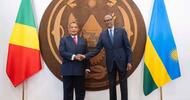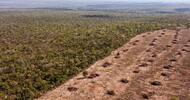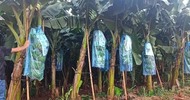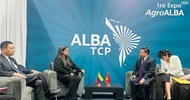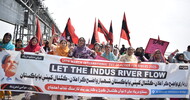Il y a quelques années, en marge d’un sommet de la Communauté des États sahélo-sahariens (CEN-SAD) à Bamako, le président du Mali, Amadou Toumani Touré, a offert 100 000 ha de terres à l’intérieur de l’Office du Niger, la principale zone de riziculture du Mali. La Libye, un pays qui regorge de pétrodollars mais ne dispose pas de sa propre production alimentaire, dirige dans les faits le CEN-SAD, et elle a sauté sur l’occasion.
A couple of years ago, on the sidelines of a summit of the Community of Sahel-Saharan States (CEN-SAD) in Bamako, Mali’s President, Amadou Toumani Touré, offered up 100,000 ha of land within the Office du Niger, Mali’s main rice producing area. Libya, a country flush with petrodollars but lacking in its own food production, effectively runs CEN-SAD and it jumped at the chance.
Federal Government is seriously considering to raise 0.1 million police personnel in each province for increasing the security for the investors, Federal Minister of Investment, Senator Waqar Ahmad Khan said at a dinner hosted in honour of ambassadors of Western countries.
- Daily Times
-
23 January 2009
Last year South Africa became a net importer of food for the first time in more than 20 years, reigniting concerns about food security and the viability of some farming sectors.
- Business Report
-
23 January 2009
Depuis quelques semaines, la tension monte entre le jeune maire d'Antananarivo, Andry Rajoelina, et le président de la République, Marc Ravalomanana.
Qatar and Malaysia have agreed to look at the possibility of investing in Islamic countries, particularly in growing food. Malaysian Foreign Minister Dr Rais Yatim told Gulf Times that certain states in his country did have land for joint cultivation but “what we are encouraging is for the two countries to go, for example, to Indonesia, or to another (Muslim) country”.
- Gulf Times
-
22 January 2009
Le rapport de prospection servant à identifier les terrains disponibles est maintenant entre les mains du comité interministériel.
- Daily Reckoning
-
22 January 2009
Promotional piece for investing in farmland
- Daily Reckoning
-
21 January 2009
Gulf governments, entrepreneurs and sovereign wealth funds have spent vast sums buying or leasing farmland across Asia and Africa to try to secure cheaper imports and keep supermarket prices low. But the World Bank and UN want them to put more money into development aid.
- The National
-
21 January 2009
According to Barclay Hedge, agricultural funds were up 9.5% in 2008, while the S&P 500 index lost 36%.
- Ag Capita
-
20 January 2009
Arab leaders called for launching an emergency Arab food and water security program, as per the draft resolution of the Arab Economic Summit, Kuna reported.
- Saudi Gazette
-
20 January 2009
Even the World Bank is continuing its role as a neo-colonial consensus agent by actively pursuing and financing access to 'under-utilised land' around the world through its International Finance Corporation.
- South African Civil Society Information Service
-
20 January 2009
For the practical realisation of the goal of food sovereignty that has been eluding our nation since the time of independence, the importance of genuine agrarian reform and peasants’ rights cannot be underestimated.
- Daily times
-
20 January 2009
Tanzania may find itself on similar a pathway like Zimbabwe where 4,500 commercial farmers own over 90 per cent of arable land including some so-called absent landlords living luxurious lives in London.
- This Day (Tanzania)
-
19 January 2009
Sudan will be proposing wheat cultivation as the first option for its role in Arab and global food security.
- Sudan Vision Daily
-
17 January 2009








